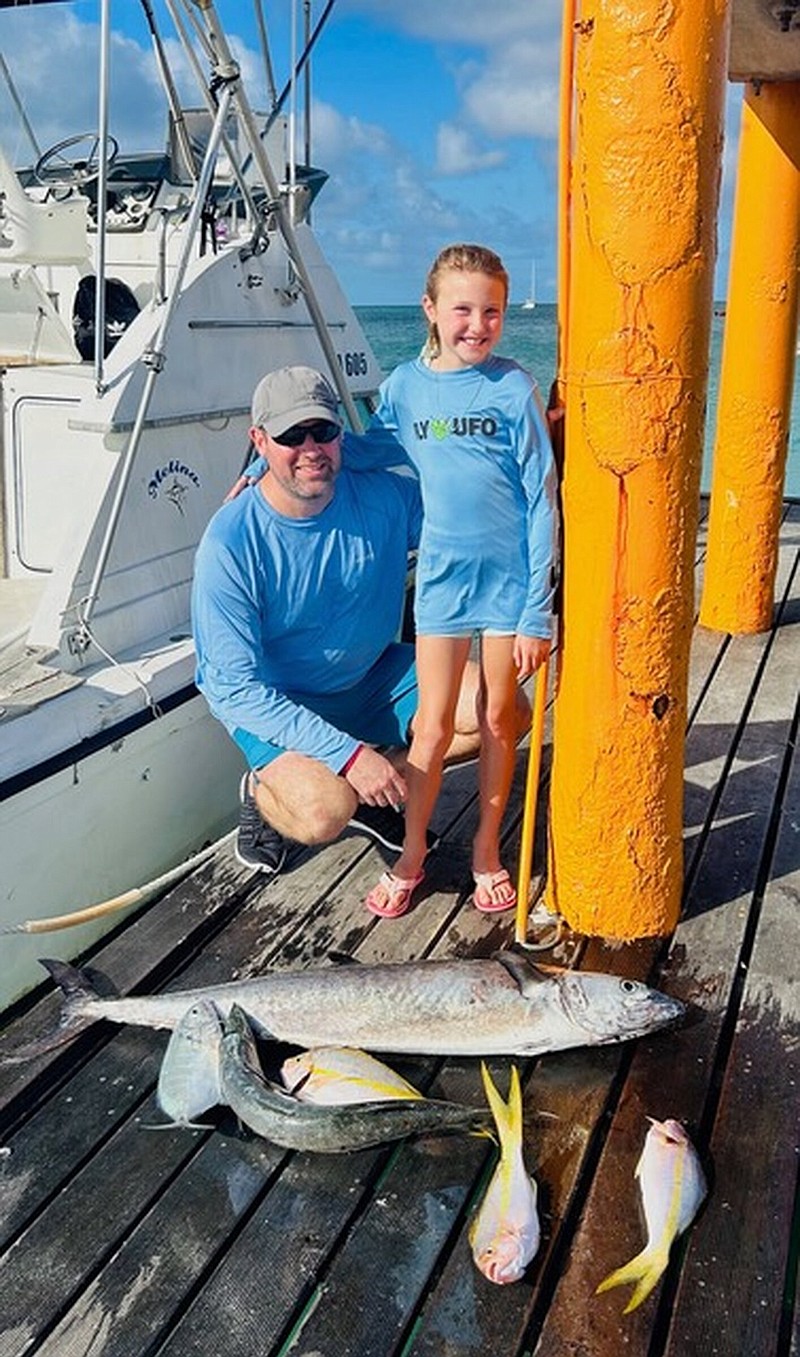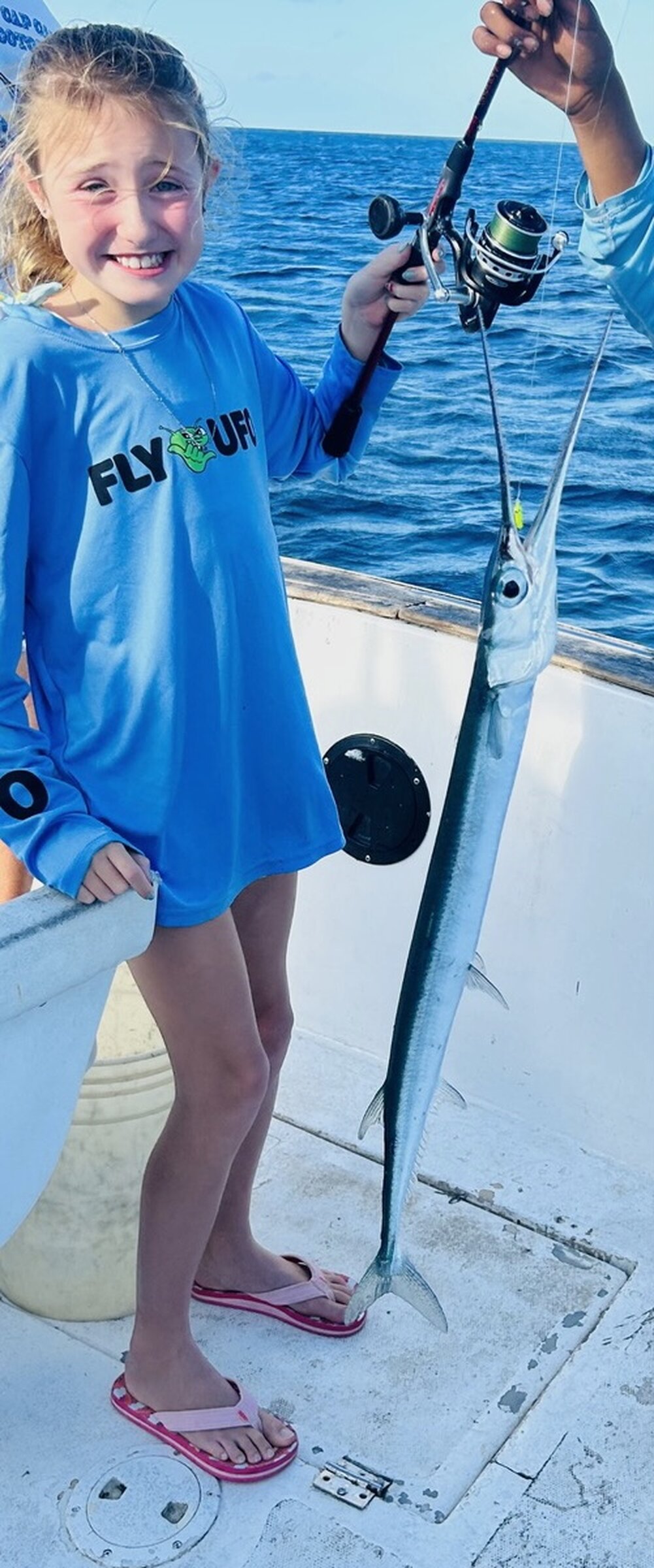Dr. Drew Rodgers and his daughter Amelia wanted a memorable fishing trip for Christmas, and Santa delivered it in the cobalt waters of Aruba.
Rodgers, a cardiothoracic anesthesiologist, took his family to Aruba, an island in the Caribbean Sea, for Christmas. Rodgers and Amelia, 9, enjoy fishing for smallmouth bass, Ozark bass and longear sunfish in the streams of Northwest Arkansas. However, it's bad form for a husband to wedge a fishing trip into a family Caribbean vacation, so Drew's wife Cara played Santa and did it for him. She booked a half-day trip for Drew and Amelia with Melina Fishing Charters in Palm Beach, Aruba.
"My wife found the outfitter," Rodgers said. "She thought it would be fun for Amelia and me to do that together."
Fortunately, the three-hour tour aboard the Melina did not go to an uncharted desert isle, but to a shipwreck on the flats about 20 minutes from the shore. The wreck was 60 feet deep. Wrecks attract a lot of fish and conditions were right for nonstop action. Rodgers said that he and Amelia caught about 35 fish of multiple species.
"We got bites almost every catch," Rodgers said. "We caught barracuda, yellowtail snapper, needlefish, strawberry grouper, parrotfish, blue runner, lizard fish and king mackerel."
For bait they used small baitfish and squid presented vertically with heavy spinning gear.
Freshwater fishermen learn quickly that saltwater fish bite differently than bass. You don't set the hook with a roundhouse sweep. Instead, you let a fish take the bait, reel the line tight and let the fish hook itself.
"The guides kind of got on to us a little bit," Rodgers said. "They could tell we were bass fishermen. They told us we had to be a little more gentle."
To catch fish away from the wreck, they used a balloon technique that's popular with striped bass guides in Arkansas. The wind pushes the balloon and drifts the bait. That is how Rodgers caught a king mackerel that weighed about 30 pounds, his largest. Rodgers also caught the barracuda, which weighed about 8 pounds.
The payoff came after the trip, when the family got to eat part of the catch.
"They had a deal where if we donated the meat to the crew and to the restaurant at the marina, the restaurant would cook it for us," Rodgers said. "It makes a trip like that more meaningful to experience it that way. I loved it that we got to enjoy the fish in a meal that we caught that morning. Amelia really liked that, too."
You don't find king mackerel, barracuda and blue runner in many Arkansas restaurants. The Centers for Disease Control and Prevention recommends not eating barracuda because large specimens harbor ciguartera toxin, which causes nausea, pain, digestive, cardiac and neurological disorders. According to many sources, however, small barracudas are safe to eat if they are freshly caught and properly cooked.
"Our guides said said they eat it locally and nobody ever gets sick," Rodgers said.
How did it taste?
"I thought it was kind of briny," Rodgers said.
Seafood sources describe barracuda as having an intense flavor similar to wild tuna with a sweet undertone.
Rodgers said that Amelia and also his daughter Emery, 13, enjoy the outdoors, and that Emery also enjoyed fishing when she was younger. He said that fishing is a great bonding activity that allows families to enjoy travels abroad on a different level than the usual tourist routine.
"It was nice just being with her out on the boat," Rodgers said. "I've done very little saltwater fishing and it was her very first time, so we were doing something new and exciting together."
Rodgers said he was most impressed with Amelia's enthusiasm. She was up and ready to go before dawn.
"I was really proud of Amelia," Rodgers said. "We got her up about 5 a.m., and had her on the dock by about 6:30. We were on the water at sunrise. She loved it! She was tired from waking up earlier than usual, but when we anchored over the shipwreck and the guides were describing all the fish we would catch, she got really excited."
Arubans speak Papiamento, a Creole blend of Spanish and Portugese. The fishing guides spoke to each other in their native language but conversed in English with the Rodgers.
Of course, Aruba's reputation took a hit when Natalee Holloway, an Alabama teenager who was killed on the island while on vacation, disappeared there in 2005. A local, Joran Van der Sloot, confessed to killing Holloway, but her body has not been found.
"It's a very low-key island," Rodgers said. "Everybody is very, very friendly. I felt very safe there. There's plenty to do there if you don't want to do the bar and club scene. It's an outdoor paradise."
Besides fishing, the Rodgers family rented an ATV and toured a national park and parts of a shoreline that you can't reach with a regular vehicle.
"I rented a mountain bike for three days and rode some world class mountain bike trails," Rodgers said.
Fishing adventures for the Rodgers will resume soon with a walleye fishing trip on the headwaters of Beaver Lake with guide John Conklin. Walleyes are delicious to eat, too!

